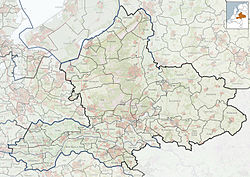Loo is a village in the municipality of Duiven in the province of Gelderland, the Netherlands. The village has a ferry connection to Huissen. A couple of houses of Loo are part of Huissen, Lingewaard, because they were on a former river island which used to belong the Duchy of Cleves.[3]
Loo | |
|---|---|
Village | |
 Sint-Antonius Church | |
| Coordinates: 51°55′44″N 5°59′20″E / 51.929°N 5.989°E | |
| Country | Netherlands |
| Province | Gelderland |
| Municipality | Duiven Lingewaard |
| Area | |
| • Total | 5.33 km2 (2.06 sq mi) |
| Elevation | 11 m (36 ft) |
| Population (2021)[1] | |
| • Total | 1,135 |
| • Density | 210/km2 (550/sq mi) |
| Time zone | UTC+1 (CET) |
| • Summer (DST) | UTC+2 (CEST) |
| Postal code | 6924[1] |
| Dialing code | 0316 |
History
editIt was first mentioned in 1294 or 1295 as Loy, and means forest.[4] The village developed near the Rhine. A chapel was built in the 15th century, and was replaced by the St. Antonius Church in 1875. The havezate Lowaard was first mentioned in 1467. It was extensively rebuilt between 1558 and 1569. In 1742, it was transformed into a farm.[5] In 1840, Loo was home to 242 people.[3]
Gallery
edit-
Farm in Loo
-
Villa in Loo
-
Statue of the village announcer
-
Party centre
References
edit- ^ a b c "Kerncijfers wijken en buurten 2021". Central Bureau of Statistics. Retrieved 22 March 2022.
Stats are for Duiven only
- ^ "Postcodetool for 6924AA". Actueel Hoogtebestand Nederland (in Dutch). Het Waterschapshuis. Retrieved 22 March 2022.
- ^ a b "Loo (Duiven)". Plaatsengids (in Dutch). Retrieved 22 March 2022.
- ^ "Loo - (geografische naam)". Etymologiebank (in Dutch). Retrieved 22 March 2022.
- ^ Ronald Stenvert & Sabine Broekhoven (2000). "Loo" (in Dutch). Zwolle: Waanders. p. 228. ISBN 90 400 9406 3. Retrieved 22 March 2022.

